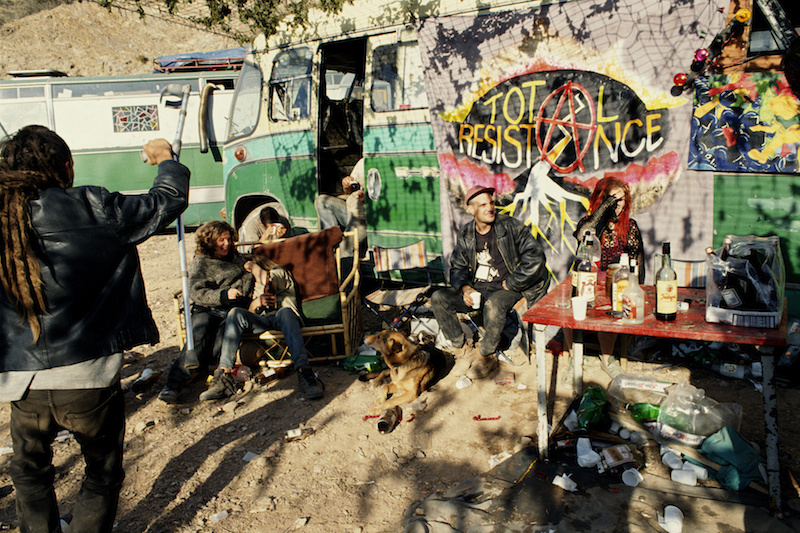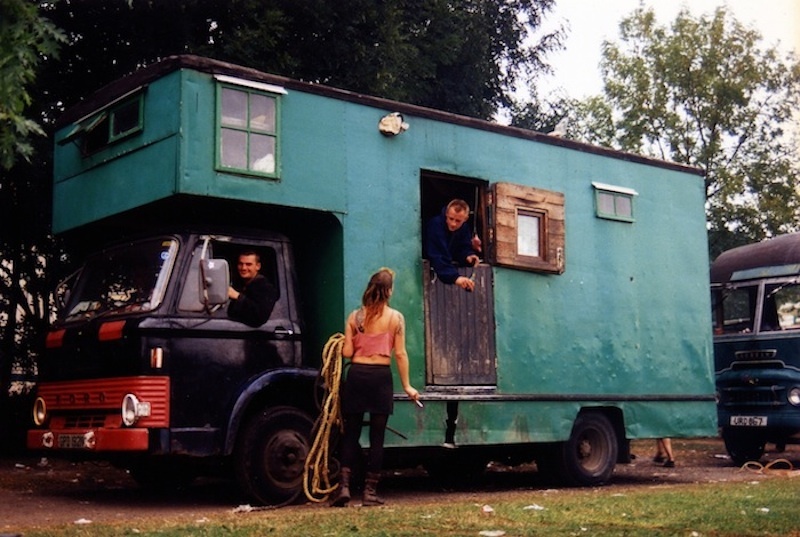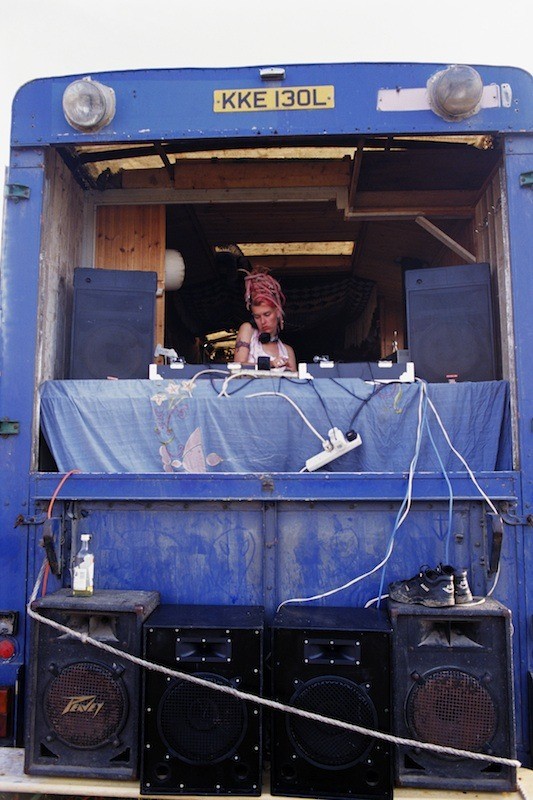This year is the 20th anniversary of the UK's Criminal Justice and Public Order Act 1994, the legislation that effectively banned raves and sent the whole British scene into the expensive confines of legitimate clubs and venues. To mark the occasion, photographer Tom Hunter is exhibiting his series Le Crowbar—a documentation of his time traveling through Europe in the mid-90s in a convoy of converted coaches, ambulances, and buses, setting up raves and impromptu festivals. See it at the "Life on the Road" exhibition at LCC in London's Elephant and Castle.
Advertisement
After relocating from Dorset to London at the age of 15 and spending some time as a tree pruner in the Royal Parks of London, Tom Hunter bought a year-long ticket to America. It was on this trip that he began taking photos, but unfortunately, as he told me, "I came back and [none of the pictures] turned out. The lens must have been broken or something."Nevertheless, it was then that he decided he wanted to be a photographer—so, in 1991, he enrolled at what was then the London College of Printing. During his time at college, Tom got involved in the squatting scene in Ellingfort Road, Hackney—a thriving community of travelers, converted vans, and derelict buildings that later became the central topic of his 1994 graduation show.

The Total Resistance soundsystemThe squats and the free festivals that sprung up around them were what introduced Tom to the rave scene. And after meeting the people behind soundsystems like Spiral Tribe and Total Resistance, he decided to establish "Le Crowbar café," a vegetarian café that followed the rave scene across Europe."The philosophy was very much DIY," he said. "No named DJs—it was all about anti-egos and not paying your money to big clubs. We all loved being in squats, going to free festivals, and listening to free music."Tom continued: "The reception from the locals was generally great. You’d turn up in a new place and they were used to paying loads of money for club nights, listening to crap music, and being pushed around by bouncers. We played great music that they loved, and they could play their own records and get in for free. People could come and go as they want—they could bring their own drink and drugs. They were blown away by it and we felt like we were on a wave of new excitement. Every city you went to you’d go to the local record shops, meet the people, get the records with the newest beats."
Advertisement
Despite having a clear vision of the nights they wanted to put on, the raves were never stringently organized. "No one had a position," Tom explained. "If you were a good drawer, you’d bang out a flyer, go into the town, photocopy it and put it around, while others would go on beer runs or sort out generators.

One of the converted vans used to travel through Europe"We were meeting people from underground scenes in France, Spain, Italy, Portugal… and it just spiraled out and got bigger and bigger. It was incredibly infectious and exciting. The café would be open 24 hours a day for five days, and after that we’d go drive off to a lake—20 or 30 people swimming every day and just hanging out."But the trips weren’t just about banging parties. "The bits on the road were really boring," Tom said. "The van would only go 38 miles per hour on the motorways. On the autobahn in Germany, lorries aren’t allowed to overtake, so you’d have masses of pissed off lorry drivers behind you. The actual traveling bit was really boring, like going to the supermarket for two hours to get the stuff to sell [at the café]."Over time, the stronghold of the community started to ebb away. When I asked what happened to everyone involved, Tom said, "Total Resistance soundsystem went through Turkey, the Middle East, and made it to India. But then the police got their head around the whole idea and decided it wasn’t social. We weren’t paying taxes, some people were dealing drugs, and the festivals attracted big groups of kids from council estates in Europe who thought it was just a free-for-all. [At first] we were a novelty, but then they realized [free parties] took money away from the clubs, so they started complaining. Same as in England—Ministry of Sound and all those big clubs cashed in on it. They wanted their money and did so by commercializing it.
Advertisement
"They said [the scene] was exciting and hyped it up, then they started up their own clubs, charged loads of money to get in, played the same music, had big bouncers, and it all became legitimized. That’s when people started to drift back to England. It’s great in the summer, but you can’t make money doing that stuff in the winter. Everything became tightly controlled and the police clamped down on it. It was very similar to the punk explosion—all that energy and excitement can’t be sustained forever. But when it was going, it was amazing.""Life on the Road" is free and runs from the 6th to the 26th of February at the London College of Communication, Elephant and Castle.Follow Caroline on Twitter: @carolinechristi
Photo by Dave Fawcett
Photo by Dave Fawcett
Photo by Dave Fawcett
